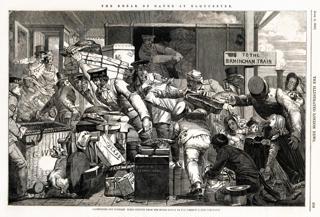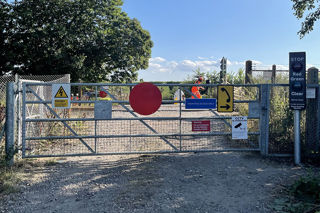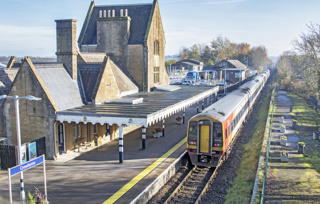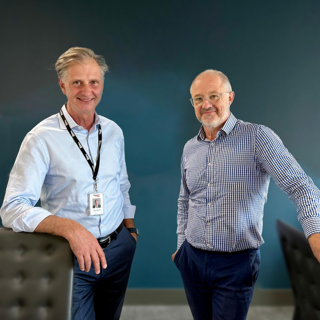Transport for London has a new interim Commissioner. One Andy replaces another Andy. Out goes Andy Byford. In comes Andy Lord.
It was a surprise when Andy Byford stepped down as the leader of Transport for London after only two years. He had seen the capital through the pandemic and secured a funding deal from central Government. But only after a long, hard fight and a lot of bitter words. He was seen as a success.
His replacement is less of a surprise. Andy Lord has been at TfL for three years. He joined as managing director of London Underground in 2019, and subsequently became chief operating officer. But he was already battle-hardened by seven years as operations director for British Airways - the longest tenure of anyone in that similarly demanding role.
In a rather dingy and careworn conference room at the bottom of TfL’s offices in Blackfriars, a couple of weeks into his new role and in the middle of industrial action on both the Underground and the Overground, Andy Lord set out his position in an interview for members of the Railway Industry Association.
His clear aim: to reassure the rest of the industry that New Andy is business-as-usual: continuity, but with continuing change. Evolution not revolution.
RailReview: When your staff leave their work and walk out to stand on picket lines, it suggests that relations between you have broken down. What are you doing about that?
Andy Lord: We have industrial action by the RMT on the Tube, and by Unite on some of the surface network.
The dispute is different to the one on national rail, which is related to pay and working conditions. On the Tube it is around jobs, conditions and pensions. We haven’t put any proposals on the table about pensions. The last thing we need, when we are trying to ensure the economic recovery of the city, is industrial action.
TfL has been through some tough times in the pandemic. We’ve seen revenues fall as low as 4% of pre-COVID. We had to go the Government for support, and we’ve received £6 billion of funding.
We have to modernise the way we work. We have to deliver efficiencies. We have to become financially sustainable. But there are no job losses.
It’s a condition of our funding agreement that we have to review our pension arrangements. But there are no proposed changes to that pension, and that is the area driving the industrial action. We think it’s unnecessary, and not in the best interests either of their members or of the organisation.
I hope we will find a way through this. It’s really hard when one side of the table believes that industrial action will change what they perceive as what the Government wants to do.
The reality is that we secured a funding agreement, without which we would not have the TfL we have today, and without which they would not have job security.
Underpinning all of your plans, all of your ambitions, is the changing pattern of travel into and within London. After the pandemic, as people get used to new ways of working, how do you see that pattern evolving?
At the height of the pandemic, we were actively discouraging people from using the network, in line with Government advice. Now, weekend and leisure traffic are almost back to 2019 levels. Weekends are regularly back in the high 90% area. But the real issue for us is Mondays and Fridays, with most people only working two or three days a week in offices.
Across an average week, we are at 80% to 83% ridership on the Tube, and 88% to 90% on the buses. But we really need more people back onto the network across the working week.
Look over the central London horizon. South Western Railway’s morning peak is still stuck at only 53% of pre-pandemic levels into Waterloo. That commuting from the suburbs and beyond has gone, hasn’t it?
There is a structural change, no doubt. We are seeing quite different geographical splits. The East and North into the City are almost back to normal in the peak. The West and the South West are very different. I come in from the South West myself, and I can see the difference on the main line network.
We have to find new ways to encourage people. For example, we are working with Canary Wharf to see how they can turn it into a destination as well as just office accommodation. They’re building a new life science park which will be directly between the Elizabeth line and the Docklands Light Railway. So that creates a new opportunity.
The Elizabeth line is your big story of 2022. We’ve just seen the latest phase of opening, with trains from Reading running into the central tunnels for the first time. What do you take away from the opening that you can apply to future projects - for both you and your supply chain?
It really is the jewel in the crown of the London transport network. I was on the very first train from Heathrow Terminal 5 at 0752 on the Sunday morning. It was really quite a moment.
The Elizabeth line shows what can be done when we get long-term investment decisions in public transport. It enables economic recovery and growth. We have the opportunity in the long term to get more investment into the network, and that benefits our supply chain partners across the rail industry, and across the country.
We are seeing some of that: the new Piccadilly Line trains are being built at Goole, in East Yorkshire. And there are more infrastructure contracts yet to be awarded.
Crossrail 2? Ever?
Well, wouldn’t we love that! That would be amazing. The route is safeguarded. I think the Bakerloo Line extension is probably slightly higher up the agenda. We’ve proven the benefit of long-term investment decisions.
Let’s talk about money. Andy Byford secured what was called a long-term funding deal. In fact, it was only for 19 months. And this is a £10bn a year organisation with 27,000 staff, where infrastructure projects can take decades. How do you go about securing a funding arrangement that is measured in years and not months?
The deal is longer-term, in that it takes us to March 2024. We will be operationally financially sustainable by then, which means we will be able to stand on our own two feet- at least from an operational expenditure perspective.
There is a clause in the agreement where the Government agrees to work with us around long-term capital funding for major investment decisions, such as further rolling stock renewal, further extensions, signalling renewal.
I am really keen to work with the new Secretary of State and his ministerial team, to see how we can start making progress on that.
One of the things I’ve done since starting as MD of the Tube is building more strategic relationships with our suppliers - looking at how, despite the funding challenges, we could secure some longer-term commercial contracts that give all sides the certainty to invest in skills and training. That’s really critical for us. We have to deliver value for money, making the most of every pound that is spent.
You’re developing a business plan that’s due in December. What is in it?
It’s very focused on how we see TfL through the next three years, using the first year related to the financial settlement we have, and then what our priorities will be going forward. Making sure TfL is financially sustainable, making sure we grow our customer and revenue stream, and moving towards net zero. There’s a lot in there: this is the first business plan we have delivered since 2019. It’s a big moment for us.
Can we look at your role in the wider national picture? The strength of your relationship with national Government, you and the other devolved authorities, and how you might fit with Great British Railways, whatever that becomes.
TfL is already working with Network Rail and the Great British Railways Transition Team around how we roll out wider contactless ticketing across the South East. We can show the benefit of TfL across the levelling-up agenda, showing the wider value we bring outside London.
TfL has been a bit on its own over the years. I am really keen that we build relationships. We are much stronger as a collective if we work together.
It’s a widely held opinion in the industry that the Treasury, and the Department for Transport are a bit wary of a devolved organisation as large and as powerful as yours, which spends its money how it chooses, independently of central government. How do you get them to trust you?
It’s a very good question. We are the largest integrated public transport authority in the world. But look at what we have delivered. The transformation on the Tube, for example.
We can also demonstrate the value we bring to the whole UK. Our buses are all built in Northern Ireland, Scotland or north Yorkshire. Our trains for the Overground are built in Derby.
I’ve come from a private sector background. I want us to be a much more commercial organisation, in terms of how we think.
We have 10% inflation. We have what the Bank of England calls the longest recession on record. We have prolonged industrial unrest. In short: we are still on a downward economic curve. Tell me what that means for your people.
It’s really tough, isn’t it? The external economic factors are harder than a lot of people have seen in their lifetimes. What we have to do is demonstrate - with our trade unions - that we can work together rather than fight against each other.
At the same time, while the Government has significant fiscal challenges, we have to make the case for long-term investment, which in return will create greater employment, improve the skills base, and deliver wider improvement - not only in the South East, but in the wider UK.
How is your style going to differ from the previous Andy - Andy Byford?
Andy and I are quite similar in many ways. We have similar principles in how we lead this organisation. I want to make TfL a really great place to work.
Andy was absolutely focused on securing the funding agreement post-COVID. And he was driven by delivering the Elizabeth line.
My focus now is on the wider TfL. We have a number of programmes to deliver. We have the Piccadilly Line, we have the DLR fleet, we have the continuation of the four-line resignalling programme. And the Silvertown road tunnel - the Tunnel Boring Machine is just about to go under the Thames.
And we have to get ridership up. We have to get revenues up. We have to deliver a consistent experience across our network.
For me, it’s about continuing Andy’s visible leadership. And also, an opportunity to rebuild some relationships, particularly with central government. But also, with the wider industry, which Andy wasn’t able to deliver quite as well, because he was in the middle of dealing with the pandemic, at a time when every meeting was done by Teams.
Hopefully now we can get out a bit more and meet in person, including with the new people involved.
You are Interim Commissioner. Everything you’ve just said sounds like you are considering sticking around. Do you intend to be more than the Interim Commissioner?
I’d like to be. Ultimately that is a decision for the Board and the Mayor, but I wouldn’t have taken on this role if I didn’t have the aspiration to do it permanently.
TfL is an amazing organisation: 27,000 direct colleagues, and another 30,000 or more who work indirectly for us in concessions and other service delivery, and the wider supply chain. I am immensely proud to have this opportunity, and I do hope it will continue.
What drives you do to that? This isn’t a Monday to Friday 9-5 job. It’s all-consuming, as Andy Byford admitted. He talked of how it took over his life, of how he took only ten days off in two years. On a purely personal level, is it more of a burden than a challenge?
I don’t think it’s a burden at all. I’ve been involved in operations and engineering all my life. I was operations director at British Airways for seven years - the longest-serving one in the airline’s history. That was full on, 24/7. I’m used to doing that.
But it is really important that we have our down time, that we take our holidays. I’ve been very clear with all my teams about that - you need competent deputies who can stand in when you’re not around. I’m a keen rugby fan, a keen cricket fan, a very average golfer. So, I try to get time to do that.
To be able to say you are leading the biggest and greatest public transport organisation in the world - there’s not at a lot that can top that.

















Login to comment
Comments
No comments have been made yet.